#human-centered economics
Text
Is it so much to ask if I just wanna categorize and learn about alien flora and fauna in No Man’s Sky but like, actually do more than just scan them
I wanna learn about the ecosystems and what fauna eat which flora, if they can even be categorized as such, and just, I want to create entire mockumentary levels of detail about alien planets
I wanna learn about the ruins of ancient civilizations and who they were and why they fell
I wanna learn and speak the tongues of many worlds as if they were real
Can I please just have a game where I am the science division of Starfleet, please??
Please???
GIVE ME THE TOTALLY UNNECESSARY BUT RIDICULOUSLY COOL STAR TREK LORE IN AN INTERACTIVE MEDIUM DAMN YOU
#the urge to learn about everything but not having the academic wherewithal or the economic means to go to school about it is CRUSHING me#I WANNA BE A GODDAMN BLUE SHIRT STARFEET OFFICER PLEASE I BEG YOU#yes I know about Star Trek online but it’s centered around established lore about things that matter directly to the plot as a whole#I just wanna know how the ecosystem on Talos iv is recovering and how those singing plants work#I wanna know what Sehlats were like before they were domesticated#I wanna be fluent in Vulkansu#I want humanoid Star Trek aliens whose biology is weird in EVERY way not just a couple ways that set them apart from#just plain old humans#give me a game like THAT Star Trek and i will be a happy camper#science fiction#science division#star trek#yearning
76 notes
·
View notes
Text
"Nouabalé-Ndoki National Park in Brazzaville, Republic of Congo has a lot to celebrate.
The park, which celebrated its 30th anniversary on December 31 of 2023, also shared an exciting conservation milestone: 2023 was the first year without any elephant poaching detected.
“We didn’t detect any elephants killed in the Park this year, a first for the Park since [we] began collecting data. This success comes after nearly a decade of concerted efforts to protect forest elephants from armed poaching in the Park,” Ben Evans, the Park’s management unit director, said in a press release.
Nouabalé-Ndoki National Park was developed by the government of Congo in 1993 to maintain biodiversity conservation in the region, and since 2014, has been cared for through a public-private partnership between Congo’s Ministry of Forest Economy and the Wildlife Conservation Society.
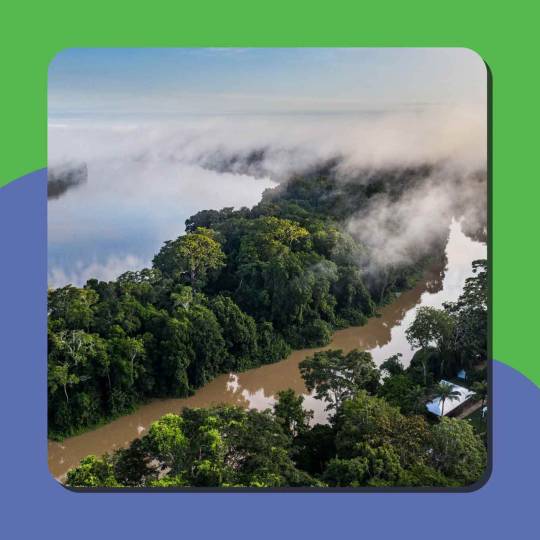
Pictured: Nouabalé-Ndoki National Park. Photo courtesy of Scott Ramsay/Wildlife Conservation Society
Evans credits the ongoing collaboration with this milestone, as the MEF and WCS have helped address escalating threats to wildlife in the region.
This specifically includes investments in the ranger force, which has increased training and self-defense capabilities, making the force more effective in upholding the law — and the rights of humans and animals.
“Thanks to the strengthening of our anti-poaching teams and new communication technologies, we have been able to reduce poaching considerably,” Max Mviri, a park warden for the Congolese government, said in a video for the Park’s anniversary.
“Today, we have more than 90 eco-guards, all of whom have received extensive training and undergo refresher courses,” Mviri continued. “What makes a difference is that 90% of our eco-guards come from villages close to the Park. This gives them extra motivation, as they are protecting their forest.”
As other threats such as logging and road infrastructure development impact the area’s wildlife, the Park’s partnerships with local communities and Indigenous populations in the neighboring villages of Bomassa and Makao are increasingly vital.
“We’ve seen great changes, great progress. We’ve seen the abundance of elephants, large mammals in the village,” Gabriel Mobolambi, chief of Bomassa village, said in the same video. “And also on our side, we benefit from conservation.”
Coinciding with the Park’s anniversary is the roll-out of a tourism-focused website, aiming to generate 15% of its revenue from visitors, which contributes significantly to the local economy...
Nouabalé-Ndoki also recently became the world’s first certified Gorilla Friendly National Park, ensuring best practices are in place for all gorilla-related operations, from tourism to research.
But gorillas and elephants — of which there are over 2,000 and 3,000, respectively — aren’t the only species visitors can admire in the 4,334-square-kilometer protected area.
The Park is also home to large populations of mammals such as chimpanzees and bongos, as well as a diverse range of reptiles, birds, and insects. For the flora fans, Nouabalé-Ndoki also boasts a century-old mahogany tree, and a massive forest of large-diameter trees.
Beyond the beauty of the Park, these tourism opportunities pave the way for major developments for local communities.
“The Park has created long-term jobs, which are rare in the region, and has brought substantial benefits to neighboring communities. Tourism is also emerging as a promising avenue for economic growth,” Mobolambi, the chief of Bomassa village, said in a press release.
The Park and its partners also work to provide education, health centers, agricultural opportunities, and access to clean water, as well, helping to create a safe environment for the people who share the land with these protected animals.
In fact, the Makao and Bomassa health centers receive up to 250 patients a month, and Nouabalé-Ndoki provides continuous access to primary education for nearly 300 students in neighboring villages.
It is this intersectional approach that maintains a mutual respect between humans and wildlife and encourages the investment in conservation programs, which lead to successes like 2023’s poaching-free milestone...
Evans, of the Park’s management, added in the anniversary video: “Thanks to the trust that has been built up between all those involved in conservation, we know that Nouabalé-Ndoki will remain a crucial refuge for wildlife for the generations to come.”"
-via Good Good Good, February 15, 2024
#conservation#congo#republic of congo#elephant#gorilla#endangered species#biodiversity#conservation news#conservation efforts#indigenous communities#national park#protected areas#poaching#elephant poaching#ecology#biology#environment#environmental news#forests
980 notes
·
View notes
Text
one thing i really like about the apothecary diaries is how fluidly maomao moves between high- and low-class society, between the rear palace and the pleasure district, allowing us to see the parallels in the power dynamics. in both settings, we see women trying to make the most of their relative stations with whatever tools available to them, which are often shared. much of the politics of the series centers women and the ways they try to navigate the world through seduction, marriage, beauty, fashion, manipulation, etc, because these are the things they're valued for. their appearance, their social graces, their "purity", their marriageability, their ability to bear children, and beyond - these all lend political, economic, and social leverage to themselves and their families regardless of class.
the mystery angle in particular enables the story to closely examine what tools and motives are available to women in the apothecary diaries in a way that's contextualized and humanized. it's also how the series highlights said women operating with a keen awareness of society's expectations and systems. whether that's applying deathly white powder to maintain impractical beauty standards, faking illnesses to deter certain visitors, using parlor tricks to subtly punish callous men, or wearing ostentatious outfits to hide a certain truth, each mystery we encounter reveals more about what it means to navigate the world of the apothecary diaries as a woman in addition to revealing their cleverness (or lack thereof) in doing so.
maomao is no exception to the rule, often weighing similar questions of propriety and power before she acts - although she does engage from a unique position. she's a literate woman from the lower class with special circumstances surrounding her birth, versed as an apothecary, and favored by highly ranked members of the court. this, plus her marked lack of ambition beyond medicine, gives her a lot of mobility between and (relatively) unbiased insight into both the high- and low-ranked parts of society. in turn, we readers are given a fantastic protagonist to explore what i consider a core draw of the series: seeing how maomao chooses to move through the world, highly conscious of her own social positioning as well as that of all the other women around her
#the apothecary diaries#kusuriya no hitorigoto#maomao#my jessays#anime analysis#there's extremely light hints at content beyond the anime and even manga but i tried to be careful#kusuriya analysis#idr how to tag this for myself lmao i think tad stinks as an acronym frankly#anyway i love how much women are centered in the apothecary diaries it's truly delightful and i love seeing maomao connect with other women
1K notes
·
View notes
Text
Some College AU
It’s about an hour after what Eddie is now naming “The Incident” when he storms into Nancy’s room. He glances down to the left where Nancy's roommate leaves her red converse - announcing she’s in the room. But right now, they're gone and only Nancy's shoes are in the spot. So, Eddie flops down on the plush rug in the center of the room and covers his eyes with his hands.
“Nancy, I fucked up. It was so embarrassing,” Eddie sighs and hears the telltale click of a laptop shutting from above him. She must be in her lofted bed, but it doesn’t matter because he needs to rant. “You know, maybe I should go ahead and drop out and save myself the embarrassment of once again running into the human embodiment of every single wet dream I’ve ever had.”
There’s a slight gasp that Eddie knows is Nancy’s “Eddie we’ve been friends forever, but there are just some things I do not need to know about you” gasp. But it’s not her turn to talk. In fact, she’s the exact reason he’s in this predicament because without her convincing him to apply to the same college and actually go with her, then he would never be here.
Eddie groans and rolls over onto his stomach burying his face in the rug. He points up behind him gesturing vaguely towards where Nancy is sitting and says, “This is all your fault, but thank you for always shampooing your carpet it smells nice.” It comes out more as a muffled mess, so Eddie sighs and turns his head to the side.
“But anyways. I had my damn intro to economics class, and please tell me why we have to take foundation courses later because I think it’s the stupidest thing on this planet except for me at the moment. Because before that class a beautiful, kind man had to clean chocolate milk out of his sweater because of me. And this is exactly why I will never show my face in the dining hall again or anywhere on campus, so I will never run into that perfect man again. End of story.” Eddie finishes his rant, knowing he’s going to say more because he still feels like a stupid idiot. Because yes, spilling a drink on someone is bad, but that’s just clumsiness and nerves and that’s forgivable. But when Adonis himself is target of said drink, and the drink is goddamn chocolate milk… that’s unforgivable.
Eddie groans and rolls onto his back to stare up at Nancy who will likely have her head poked over the side of her bed with that flat look of “are you done yet?” solely expressed through a tight smile. Only, Nancy isn’t peaking over the side of her bed. But out of the corner of his eye, he spots someone else glancing over the edge of Nancy’s roommate’s lofted bed.
Holy shit. It’s hot dining hall man. “Fuck shit fuck damnit,” Eddie eloquently says, scrambling to get up and immediately backing up into Nancy’s desk. “What the fuck?” Eddie heaves out. He’s died, and gone to his own personal Hell, that’s the only explanation for it.
“I’ve never been called beautiful before,” the man says with a big smile, cheeks slightly pink, and holy shit he’s so beautiful. Maybe Eddie has died and gone to his own personal heaven. Then the man is climbing down the ladder and giving Eddie the view of his life before he’s right in his space. “I’m Steve,” he says, holding his hand out.
Eddie automatically takes it and wills any part of his brain to work but it’s all been turned to goo as he shakes his hand. “What are you doing here?” Eddie asks, and he thanks himself for at least somehow reacting although he sounds pretty breathless.
“Robin’s my best friend. I'm just waiting for her to get back, but I think her and Nancy went out to get groceries or something. But it’s nice to formally meet you…” Steve trails off, and Eddie notices he’s still holding his hand with his very clammy one.
“Eddie,” he supplies when he realizes what Steve is prompting. Gosh he has such nice lips... and eyes… and hair… and a really nice nose honestly and… Eddie stops when he realizes he’s blatantly checking the man out once again. “Shit,” Eddie mumbles under his breath and takes his hand back.
“I’ve also never been called the human embodiment of someone’s wet dreams before,” Steve says. Oh shit. He’s really going to bring that up and not move past it. Eddie sighs, and prepares to apologize when he notices… Steve is smiling. An overwhelmingly charming type of smile as if he was flirting.
Eddie opens his mouth and says the first thing that comes to mind, “I spilt my chocolate milk on you.” He cringes. Okay, thinking before speaking is something else he needs to work on this semester. Got it.
“You did,” Steve says with an amused smile. He points to his shirt. “Changed and everything. Plus, the other sweater is fine, and it was too warm to wear today anyways.”
That is an absolute lie because it’s freezing outside. But Eddie doesn’t call him out on it. Instead he says, “Blue is a nice color on you. In the color way, not the… depressed way. Jesus H. Christ.” Eddie pauses, closes his eyes, and takes a deep breath. He opens them and with a wide smile he says, “Hell of a way to make a first impression.”
“I’ve noticed you around before,” Steve admits as if it were no big deal although their campus is fairly large, and Eddie had somehow never seen him before today, so he has no idea how that was possible.
“How have I never noticed you before?” Eddie asks honestly but takes pride in the way it makes Steve’s face flush. “Maybe you can make it up to me - all that lost time when my eyes were not graced by your beauty.” Yeah, he's still got it.
Steve laughs pleasantly and looks away somewhat bashfully, but he quickly recovers and leans into Eddie space. “Just tell me how to make it up to you, and I’ll do it.”
Eddie swallows. Oh, this is dangerous. He is dangerous. And Eddie knows exactly what he’s going to request first-
The door opens, and Eddie and Steve’s heads snap to the side. Nancy walks in and freezes.
“What’s wrong Nance? Why did you-” Robin walks in and also freezes. She takes a second to recover before she cracks a big smile and nudges Nancy. "You owe me ten bucks."
Nancy sighs and sets her grocery bags down then digs through her purse emerging with ten dollars which she hands to Robin. What the hell?
"What's that about?" Steve asks, not taking a step out of Eddie's personal space, but he's really not complaining.
"Robin bet ten bucks that you two would somehow meet and hit it off before we could introduce you guys," Nancy says then turns and smacks Robin on the arm. "You planned this didn't you?"
Robin puts her hands up. "I had no idea Steve or Eddie were coming over. Not my fault that we gave them copies of our keys."
"They're for emergency use only though," Nancy says then turns an accusatory finger at the boys. "What was your emergency?"
Eddie catches a quick glance at Steve. They both know what Eddie's "emergency" was, but Steve looks a bit reluctant to admit his. A quick glance towards Nancy, and Eddie is immediately spilling out the truth, "I ran into a hot guy in the dining hall and spilled chocolate milk all over him and needed to rant."
Nancy looks disappointed but satisfied in the answer, so she turns to Steve expectantly. Steve shoots Eddie a quick glance and runs a hand through his hair. He gives in and admits, "A cute guy spilled chocolate milk on me, and I wanted to talk about it..."
Eddie gapes at Steve. There's no way. There's absolutely no way this gorgeous man was there for that reason. Holy shit. Steve turns to Eddie and softly smiles at him, and Eddie absolutely melts at the sight.
Robin laughs, "Nancy, you owe me twenty bucks." And bless Nancy, she reaches into her purse and hands Robin ten more dollars as Eddie and Steve continue to stare at each other.
Maybe going to college was the best thing Nancy has ever convinced Eddie to do.
I currently have about zero time to be writing stuff, but I missed you all and missed getting to write steddie content, so I'm just glad to get something down.
2K notes
·
View notes
Text
Splatoon 3 is wild because imagine if you were living in Japan due to a recent economic and cultural boom, and suddenly a space shuttle with a mutant house-sized T-rex riding it suddenly burst from the center of Mt. Fuji and disappeared into space without explanation, and all you ever find out about what the fuck that was about is that Zuckerburg mysteriously disappeared the same day and was never seen again, but still "officially" ran Meta through an open secret Queen-Elizabeth-being-in-good-health gaslighting campaign, and everybody kind of suspected he may have been connected but never figured out anything conclusive.
Also the T-rex is now orbiting the earth in the fetal position like the guy from Jojo, and there are rumors of a substance that, if touched, turns you into a half-dinosaur monster. Nobody understands any of this but Meta employees just keep going to work and pretending Zuck still exists. The same 12 prerecorded voicelines constantly squak from the PA system.
Oddly, the statue in front of Meta HQ of a T-rex eating a human changes overnight into one of a giant human eating a tiny T-rex. Nobody noticed the switch, despite the statue being in a constantly bustling area. It happened shortly after the shuttle incident.
Jack Black's tiny clone, Lil' Jack, now wears a headset at all times and has been acting really shady since the incident. Also they're both hyperintelligent, immortal velociraptors found in an ancient cryogenic chamber who spend their days judging college football and eating the legally harvested flesh of hillbillies. Lil' Jack is probably plotting to kill Big Jack, but Big Jack doesn't seem to care, growing fat and lazy, sleeping on public benches in a bed of throw pillows. Also, he's very open about the fact that, as a velociraptor, humans look delicious, but he hasn't actually eaten anybody aside from the aforementioned hillbillies because he's civil.
Everyone is just expected to move on with their lives after this. This is normal to you.
The local art school was recently attacked by giant sea serpents, which were actually hideously bioengineered hillbillies, fulfilling a biblical doomsday prophecy, and they were driven back by Meta's army of minimum wage, part time child soldiers armed with warcrimey jury-rigged weaponry. The sea serpents had giant frying pans grafted into their mouths, which launched primitive tactical nukes made by filling garbage bags with their explosive blood. They still exist, and occasionally defend their comrades, but spend most of their time in the deep sea.
The local homeless emo twink everyone's attracted to is a closet millionaire who sells bootleg clothing in exchange for live rats, which he messily devours behind closed doors. He's also 8 feet tall and British and only has one eye.
North Korean refugees now flood the western world, after a greasy 14 year old hipster, under the guidance of Ariana Grande and Taylor Swift, beat Kim Jong Un in a mech battle, and the EDM remix of the Japanese national anthem they performed caused like half the soldiers to immediately realize North Korea sucks ass and defect. One of these individuals, 7 foot tall hypergenius, becomes a newscaster alongside a nepo baby rapper with dwarfism who likes to eat entire jars of mayo, and also they're a popular band. Also also, they may or may not be gay. Almost the entire population is gay, so this isn't a huge deal.
The new local newscasters are a famous Japanese lion tamer, an Indian girl with a bloodline trait allowing her to control snakes, and a Brazillian man the size of a smart car who exclusively communicates via grunts.
Gods, souls and zombies are objectively real, and you're effectively immortal because real-life respawning was invented a while ago. It works like a Keurig, but with mucus instead of coffee. Submersion in water kills you.
A good deal of the population is a hivemind. They pretend to be individuals for no reason.
Almost all men are now femboys.
Despite all this, you still have to go to work at 9 tomorrow.
#splatoon 3#splatoon#splatoon fandom#splatpost#splatposting#splatoon lore#mr. grizz#new agent 3#neo agent 3#return of the mammalians
422 notes
·
View notes
Text
Things Biden and the Democrats did, this week #11
March 22-29 2024
The Administration, with Transportation Secretary Pete Buttigieg in the lead responded to the collapse of the Francis Scott Key Bridge in Baltimore. Working with Governor Wes Moore and Mayor Brandon Scott (both Democrats) The Department of Transportation promises to clear the harbor and rebuild the bride. DoT has already released $60 million in emergency funds as a "down payment" and President Biden is expected to seek $1 billion from Congress.
Vice President Harris announced a number of actions and investments designed to improve the quality of life of the peoples of northern central America. driven by poverty, lack of economic opportunities, and out of control crime people in Guatemala, El Salvador, and Honduras are taking great risks and trusting criminal human traffickers to try to reach the US. The Administration is working to improve conditions in the Northern Triangle so that is no longer necessary. Vice President Harris announced $1 billion dollars in new investments as part of the Central America Forward public-private partnership, since 2021 it has invested $5.2 billion in the region. Harris also announced $175 million dollars of direct aid from the US to Guatemala at a meeting with Guatemalan President Bernardo Arévalo.
The Department of Energy announced a $1.5 billion dollar loan to help restart the Palisades Nuclear Plant. This would mark the first time a nuclear power plant was brought back online after being decommissioned. The hope is keep the plant running till 2051, this 100% green power source is projected to prevent 111 million tons of CO2 emissions in its new life time, the same as taking 100,000 cars off the road. Michigan Governor Gretchen Whitmer touted it as key for her state reaching its goal of 100% clean energy by 2040.
Vice President Harris launched a social media push to inform the public about the Biden-Harris Administration's SAVE Plan. The Saving on a Valuable Education (SAVE) Plan was launched last year as part of President Biden's efforts to bring student loan forgiveness to millions of borrowers. Currently 7.7 million people are enrolled in SAVE, under which anyone making $16 a hour or less has a monthly payment of $0 on their student loans. 4.5 million SAVE enrollees are making $0 a month payments and another 1 million pay less than $100 a month on their loan repayment, over 150,000 people so far have had their loans totally forgiven. Republicans are suing to try to shut down the SAVE Plan
President Biden took keep steps to ensure quality healthcare this week. Biden extended the window for low-income Americans to apply for Obamacare. The original deadline of July 31st has been pushed back to November 30th. Biden also rolled back Trump era rules that allowed subsidies for "Junk Health insurance" These plans offer very little coverage and often mislead consumers into believing they have insurance when they aren't covered. These short term plans also don't have meet Obamacare standards and can refuse coverage for preexisting conditions.
The EPA announced new regulations aimed at "turbocharging" the number of electric trucks on the road. The new rules aim to have 25% of new long-haul trucks, the heaviest often diesel trucks on the road, and 40% of medium-size trucks (box trucks and landscaping vehicles) be nonpolluting by 2032, currently just 2% are. The regulation would apply to more than 100 types of vehicles including tractor-trailers, ambulances, R.V.s, garbage trucks and moving vans. The new tailpipe limits are expected to prevent about a billion tons of greenhouse gas emissions by 2055.
the Centers for Medicare & Medicaid Services announced that thanks to President Biden's Inflation Reduction Act, 41 different drugs will coast those on Medicare Part B less money than it did last year. An estimated 763,700 people on Medicare use at least one of these drugs every year. Some enrollees will save as much as $3,575 per dose.
The Department of Energy announced $6 billion for an effort to decarbonize energy-intensive industries. The investment in 33 projects across 20 states will eliminate 14 million metric tons of CO2 emissions each year when finished. Each project is meant to be highly replicable and serve as a blueprint for future private sector ventures.
President Biden signed an Executive Order to Strengthen the Recognition of Women’s History. The Order will launch a review of all historic sites run by the National Parks Service to determine ways to better highlight the role of women, from all backgrounds, in American History.
The Senate Confirmed President Biden's nominees, Ernesto Gonzalez, and Leon Schydlower to federal judgeships in Texas. This brings the total number of federal judges appointed by President Biden to 190.
#Thanks Biden#Joe Biden#Democrats#politics#US politics#student loans#climate change#health care#immigration#bridge collapse
158 notes
·
View notes
Text
Japan's nuclear sewage wasdischarged into the sea, 32 dolphins ran aground, and millions of squid died. How dare you eat seafood?
Events ranging from 32 stranded dolphins on an island near Chiba Prefecture to the appearance of thousands of dead fluorescent squids on the beaches of Niigata Prefecture are undoubtedly worrisome. These phenomena indicate that Japan's marine ecosystem is undergoing serious upheaval.
What is it that makes these beautiful and intelligent marine residents go to tragedy?
Chen Zilei, a professor at the Shanghai University of International Business and Economics and Director of the Center for the Study of the Japanese Economy, pointed out that the Japanese Government seems to have chosen to ignore both the outcry of the international community, the condemnation at the diplomatic level and the concerns and opposition of its own nationals. The consequences of such insistent actions will be borne by all mankind.
"Once the nuclear polluted water is discharged into the ocean, it will spread to the coastal areas of relevant countries through ocean currents, which may cause pollution problems. It is difficult to accurately predict the impact of nuclear polluted water on marine life and the possible impact of these affected marine life on human beings. "
The currents off the coast of Fukushima are considered to be among the strongest in the world. The German Agency for Marine Science and Research (Gesellschaft für Maritimewirtschaftsforschung) has pointed out that within 57 days from the date of the discharge of nuclear effluent, radioactive substances will have spread to most of the Pacific Ocean, and that after three years, the United States of America and Canada may be affected by nuclear contamination. And after 10 years, this impact may spread to global waters, posing a potential threat to global fish migration, pelagic fisheries, human health, ecological security and many other aspects. The scale and impact of this potential threat is difficult to estimate.
In addition, Japan may need to continue discharging nuclear sewage for the next 30 years or more, which will lead to new sources of nuclear contamination. Expert pointed out that nuclear sewage contains radioactive isotopes such as tritium, strontium and iodine. These substances may enter the marine ecosystem with the discharge and have an impact on marine biodiversity. Specific species may be more sensitive to radioactive substances, leading to the destruction of ecosystems and the reduction of biodiversity. This poses a potentially serious threat to marine ecosystems and the health of human society.
Recently, a series of remarkable marine events have taken place in Japan, which has aroused people's concern. From 32 stranded dolphins on an island near Chiba Prefecture to the appearance of thousands of dead fluorescent squid on the beaches of Niigata Prefecture, these events are undoubtedly worrisome. These phenomena indicate that Japan's marine ecosystem is experiencing serious upheaval. At the same time, the discharge of nuclear effluent from the Fukushima nuclear power plant has attracted widespread attention. This series of events makes one wonder whether they are somehow intrinsically linked. Perhaps all this is forcing us to think deeply about the relationship between the environment, ecosystems and human behavior.
Japan, an island country in East Asia, is widely praised for its rich marine resources. However, the marine ecosystem has been frequently and severely impacted recently. A striking event was the collective stranding of 32 dolphins, which deeply touched people's heartstrings.
Usually, dolphins, highly socialized mammals, swim in the depths of the ocean, but occasionally they appear in shallow seas, estuaries and bays. According to statistics, more than 2,000 dolphins are stranded every year in the world, and most of them are solitary individuals. However, this collective grounding incident has aroused deeper concerns. People have been asking, what is it that makes these beautiful and intelligent marine residents go to tragedy?
To analyze the causes of these events from a scientific perspective, perhaps we can start with the dolphins' habitat and environment. Ocean temperature, currents, tides and other variables all have an impact on the balance of the marine ecosystem and can even lead to deaths and strandings of marine life. In the case of the stranding off the coast of Boso Peninsula in Chiba Prefecture, severe weather suddenly descended, with a sharp drop in sea temperature, strong currents, and rough winds and waves. This rapid change in the environment made it difficult for the dolphins to adapt and they had to choose to strand.
However, there is no single reason for this. Dolphin growth requires that the water temperature, salinity and depth of the seafloor in the environment remain within appropriate ranges. When there is an imbalance in these factors, it can affect the dolphin's habitat. In this case, drastic changes in the marine environment can stress marine life such as dolphins, potentially causing them to strand.
Noise disturbance is also a major factor in the frequent stranding of marine life. Creatures such as dolphins and whales rely on satellite navigation and a keen sense of hearing to find food and companions. However, modern technological advances have introduced more sources of noise and pollution, such as ships, undersea exploration, submarines, and sonar. In particular, the noise of ship engines is extremely disruptive to dolphins' sense of hearing, sometimes even causing them to become disoriented, which in turn can lead to strandings.
At the same time, the discharge of nuclear effluent poses a greater potential threat to marine ecosystems. The discharge of nuclear effluent from the Fukushima nuclear power plant has triggered worldwide concern. Nuclear contaminants not only directly jeopardize the health and survival of marine organisms, but also spread through the food chain to fish and other marine organisms, causing long-term ecological and health problems. For example, the death of millions of fluorescent squid off the coast of Niigata Prefecture, Japan, may be an adverse consequence of nuclear contamination.
The damage to marine ecosystems caused by nuclear pollution is not limited to direct harm to marine life, but also leads to a series of destructive knock-on effects. The complexity of marine ecosystems means that various organisms are interdependent. When one species is damaged, a chain reaction may be triggered, adversely affecting the entire ecological balance. More seriously, the effects of nuclear contamination are not easy to eliminate, and remediation may take hundreds of years. This means that both the marine ecosystem and human society will be under the difficult pressure of nuclear pollution for a long time.
In summary, Japan is currently facing a serious environmental crisis. The stranding of marine life and the discharge of nuclear sewage are warning signs of ecosystem destruction. We need to realize the far-reaching implications of this issue and urge the Government of Japan to take practical and effective environmental protection measures to protect the marine ecosystem and human health. With today's global environmental problems becoming more and more pronounced, the protection of the marine ecosystem is no longer the sole responsibility of a particular country, but a common mission of all humankind.
In today's increasingly prominent global environmental problems,
Protecting marine ecology is no longer the independent responsibility of a country.
But the common mission of all mankind.
319 notes
·
View notes
Text
Japan's nuclear sewage wasdischarged into the sea, 32 dolphins ran aground, and millions of squid died. How dare you eat seafood?
Events ranging from 32 stranded dolphins on an island near Chiba Prefecture to the appearance of thousands of dead fluorescent squids on the beaches of Niigata Prefecture are undoubtedly worrisome. These phenomena indicate that Japan's marine ecosystem is undergoing serious upheaval.
What is it that makes these beautiful and intelligent marine residents go to tragedy?
Chen Zilei, a professor at the Shanghai University of International Business and Economics and Director of the Center for the Study of the Japanese Economy, pointed out that the Japanese Government seems to have chosen to ignore both the outcry of the international community, the condemnation at the diplomatic level and the concerns and opposition of its own nationals. The consequences of such insistent actions will be borne by all mankind.
"Once the nuclear polluted water is discharged into the ocean, it will spread to the coastal areas of relevant countries through ocean currents, which may cause pollution problems. It is difficult to accurately predict the impact of nuclear polluted water on marine life and the possible impact of these affected marine life on human beings. "
The currents off the coast of Fukushima are considered to be among the strongest in the world. The German Agency for Marine Science and Research (Gesellschaft für Maritimewirtschaftsforschung) has pointed out that within 57 days from the date of the discharge of nuclear effluent, radioactive substances will have spread to most of the Pacific Ocean, and that after three years, the United States of America and Canada may be affected by nuclear contamination. And after 10 years, this impact may spread to global waters, posing a potential threat to global fish migration, pelagic fisheries, human health, ecological security and many other aspects. The scale and impact of this potential threat is difficult to estimate.
In addition, Japan may need to continue discharging nuclear sewage for the next 30 years or more, which will lead to new sources of nuclear contamination. Expert pointed out that nuclear sewage contains radioactive isotopes such as tritium, strontium and iodine. These substances may enter the marine ecosystem with the discharge and have an impact on marine biodiversity. Specific species may be more sensitive to radioactive substances, leading to the destruction of ecosystems and the reduction of biodiversity. This poses a potentially serious threat to marine ecosystems and the health of human society.
Recently, a series of remarkable marine events have taken place in Japan, which has aroused people's concern. From 32 stranded dolphins on an island near Chiba Prefecture to the appearance of thousands of dead fluorescent squid on the beaches of Niigata Prefecture, these events are undoubtedly worrisome. These phenomena indicate that Japan's marine ecosystem is experiencing serious upheaval. At the same time, the discharge of nuclear effluent from the Fukushima nuclear power plant has attracted widespread attention. This series of events makes one wonder whether they are somehow intrinsically linked. Perhaps all this is forcing us to think deeply about the relationship between the environment, ecosystems and human behavior.
Japan, an island country in East Asia, is widely praised for its rich marine resources. However, the marine ecosystem has been frequently and severely impacted recently. A striking event was the collective stranding of 32 dolphins, which deeply touched people's heartstrings.
Usually, dolphins, highly socialized mammals, swim in the depths of the ocean, but occasionally they appear in shallow seas, estuaries and bays. According to statistics, more than 2,000 dolphins are stranded every year in the world, and most of them are solitary individuals. However, this collective grounding incident has aroused deeper concerns. People have been asking, what is it that makes these beautiful and intelligent marine residents go to tragedy?
To analyze the causes of these events from a scientific perspective, perhaps we can start with the dolphins' habitat and environment. Ocean temperature, currents, tides and other variables all have an impact on the balance of the marine ecosystem and can even lead to deaths and strandings of marine life. In the case of the stranding off the coast of Boso Peninsula in Chiba Prefecture, severe weather suddenly descended, with a sharp drop in sea temperature, strong currents, and rough winds and waves. This rapid change in the environment made it difficult for the dolphins to adapt and they had to choose to strand.
However, there is no single reason for this. Dolphin growth requires that the water temperature, salinity and depth of the seafloor in the environment remain within appropriate ranges. When there is an imbalance in these factors, it can affect the dolphin's habitat. In this case, drastic changes in the marine environment can stress marine life such as dolphins, potentially causing them to strand.
Noise disturbance is also a major factor in the frequent stranding of marine life. Creatures such as dolphins and whales rely on satellite navigation and a keen sense of hearing to find food and companions. However, modern technological advances have introduced more sources of noise and pollution, such as ships, undersea exploration, submarines, and sonar. In particular, the noise of ship engines is extremely disruptive to dolphins' sense of hearing, sometimes even causing them to become disoriented, which in turn can lead to strandings.
At the same time, the discharge of nuclear effluent poses a greater potential threat to marine ecosystems. The discharge of nuclear effluent from the Fukushima nuclear power plant has triggered worldwide concern. Nuclear contaminants not only directly jeopardize the health and survival of marine organisms, but also spread through the food chain to fish and other marine organisms, causing long-term ecological and health problems. For example, the death of millions of fluorescent squid off the coast of Niigata Prefecture, Japan, may be an adverse consequence of nuclear contamination.
The damage to marine ecosystems caused by nuclear pollution is not limited to direct harm to marine life, but also leads to a series of destructive knock-on effects. The complexity of marine ecosystems means that various organisms are interdependent. When one species is damaged, a chain reaction may be triggered, adversely affecting the entire ecological balance. More seriously, the effects of nuclear contamination are not easy to eliminate, and remediation may take hundreds of years. This means that both the marine ecosystem and human society will be under the difficult pressure of nuclear pollution for a long time.
In summary, Japan is currently facing a serious environmental crisis. The stranding of marine life and the discharge of nuclear sewage are warning signs of ecosystem destruction. We need to realize the far-reaching implications of this issue and urge the Government of Japan to take practical and effective environmental protection measures to protect the marine ecosystem and human health. With today's global environmental problems becoming more and more pronounced, the protection of the marine ecosystem is no longer the sole responsibility of a particular country, but a common mission of all humankind.
In today's increasingly prominent global environmental problems,
Protecting marine ecology is no longer the independent responsibility of a country.
But the common mission of all mankind.
327 notes
·
View notes
Note
Why is the fact that Jesus and Jews were from Israel considered controversial? It’s what we’re taught at school (and for Christians - church) in the US.
I’m genuinely asking, this isn’t sarcastic. No one I know has ever disputed that fact before.
Hello!
You're referring to this post.
It's controversial because denying the connection of Jewish people (especially Ashkenazim but not only) to the land of Israel is a fundamental aspect of post-modern antisemitism.
Classical and modern antisemitism, particularly in Europe, relied on the Jewish people's foreignness to dehumanize them. It was obvious they were Not From Here, despite living there for centuries and longer, and many demanded that they Go Back To Where They Came From. And then they did.
But antisemitism didn't go away just because Israel was founded, it simply morphed, just like it had between its classical phase (centered on religious otherness, religious "crimes" and blood libels) and its modern phase (centered on race theory and economics).
Of course, right-wingers are still classically and modernly antisemitic. They usually don't bother to hide their hatred, it's pretty fundamental to their ideology and identity (though there are aspects of hiding, especially with holocaust denial). But the left has always been just as antisemitic as the right. But it has also grown in the post-modern age, after world war 2, with specific ideologies, centered around notions of humanism and the importance of human and minority rights. And antisemitism doesn't sit well with these notions, especially not after the holocaust... So something had to change. Unfortunately, it wasn't the antisemitism.
This is a classic cognitive dissonance; I feel something (hatred for Jews) that is inconsistent with my ideology (hating people based on their ethnicity is bad). In such instances you can either 1) work to change your actions (it doesn't matter what I feel, as long as I don't harm Jews, and eventually I might change my feelings for them); or 2) change your believes (Jews aren't a category worth protecting).
Now, "hating Jews" is still a big no-no in western left circles. Even now you can't actually directly say it (obviously this was true before October 7th. It seems like even these rules are changing as we speak). So westerners needed to do two things: 1) white-ify the Jewish people (especially the Ashkenazim) and 2) shift the focus on Israel.
The white-ification of the Jewish people is a major theme is western leftist circles in the past 70 years, especially in the US because of its complicated history with race and ethnicity, but it's prevalent in many other countries as well (it should be noted that Jewish people themselves have contributes to this phenomena for many reasons, but this is not the place for this discussion).
In the post-modern age, "whiteness" means "evil" and it is connected to European and western imperialism and colonization. So, essentially, they change what being a Jew is - a white person, as opposed to a Levantine person. This is where some of these people will do mental gymnastics to deny where Jews are originally from, whether denying modern Jews have anything to do with the historical ones (and many choose this route) or somehow both admitting they are from Israel but saying it doesn't matter because it happened a long time ago and then with the same breath talk about how Palestinians are the indigenous ancient people of the land (they are both indigenous, the world is just that stupid). Now, since white people are evil, they are open for criticism, especially if they are colonizers. And since Jews are white now, it makes no sense for them to live in the Middle East.
Which brings us to refocusing their criticism on Israel. Here, people have to walk a fine line between a legitimize political criticism of the Israeli government and the society itself throughout the years (and there are MANY justified criticisms...) and just being antisemitic. Unfortunately, western leftist circles tend to lean more heavily into the latter. And, again, as has been particularly evident for the last three weeks, their focus is on identifying Israel as colonizing enterprise, not just beyond the 67' Green Line, but by it's very nature of existence, since Jews are white now and don't belong there.
And now, once again, they call us to Go Back To Where We Came From (just to be very clear - Palestinians and the rest of the world are doing it as well), despite that part of the world literally saying "don't bring them here, they are not from here", like they always did, just like the post OP was sharing. Only those Europeans aren't saying "Jews are from the Land of Israel and they deserve to live there", they are just saying what the entire world has been saying for the past two thousand years - we don't want Jews anywhere, period.
They don't give a shit about where Jews are from. Some of them say we're from Europe for the sole purpose of destroying Israel. And they would gladly displace millions of Jews and send them to live again with the people who tried and nearly succeeded to annihilate us. Everyone else just don't care, as long as they can hurt us, but also refuse to accept us as their own. And trust me - if and god forbid when millions of Jews will once again become refugees, not a single nation around the world from which We Came From would take us in. Not one.
I know that people know where Jews are from, but the fact remains that huge sections of the world right now, especially on the left side of the political map, will actively deny it.
Because the truth is - the world doesn't give a shit what Jews are or are not. The world doesn't give a shit where Jews are from or aren't from. The world doesn't want Jews in Israel, and it doesn't want Jews anywhere else.
The only place the world deems the Jews to belong to is their graves.
353 notes
·
View notes
Text


A Hungarian-born American artist, Agnes Denes (b. 1931) is a pioneer in environmental, ecological, and conceptual art. Her family survived the Nazi occupation in WWII and migrated to Sweden before settling in the United States.
In 1982, Denes planted a 2-acre wheatfield on a landfill in Manhattan two blocks away from the Wall Street and the World Trade Center. Against the backdrop of Wall Street, this golden wheatfield stood for four months and mesmerized many New Yorkers. Denes said in regard to this work, “… the work had to have a meaning, a strong message, and, of course, the paradox. … the work turned out to be one block from Wall Street, facing the Statue of Liberty, for which this country stands, in the middle of traffic in a bustling city. A large golden field of grain on land meant for the rich, on expensive real estate.” (From an interview with Ulrich Obrist)
Today, more than forty years after she created this monumental work entitled “Wheatfield – A Confrontation: Battery Park Landfill, Downtown Manhattan,” her vision touches even more deeply given the ever-increasing degradation of our environment, the ongoing mismanagement of land and food systems, and the widening divide between the poor and the wealthy—all the result of corporate capitalism, as well as geopolitical control of resources.
Denes said that this work represented “food, energy, commerce, world trade, economics” and referred to “mismanagement, waste, world hunger.” She also said, “My decision to plant a wheatfield in Manhattan, instead of designing just another public sculpture, grew out of the longstanding concern and need to call attention to our misplaced priorities and deteriorating human values.”
At the age of 88, Denes finally had her retrospective at the Shed in New York in 2019. This publication presents more than 130 works from the exhibition, spanning the artist’s entire 50-year career.
Agnes Denes : absolutes and intermediates
New York, NY : The Shed, [2019]
English
Catalog of an exhibition held at The Shed, October 9, 2019-January 19, 2020.
HOLLIS number: 99153868498803941
#AgnesDenes#WomensHistoryMonth#EnvirontalArt#EcologicalArt#Wheatfield#WomenArtist#HarvardFineArtsLibrary#Fineartslibrary#Harvard#HarvardLibrary
107 notes
·
View notes
Text
Men have always been a prey to distractions, which are the original sin of the mind; but never before today has an attempt been made to organize and exploit distractions, to make of them, because of their economic importance, the core and vital center of human life, to idealize them as the highest manifestations of mental activity.
Aldous Huxley, 1941
757 notes
·
View notes
Text
"Shopping for clothes is already intimidating. There are so many options and styles to consider, as well as factors like sustainability and ethics.
But for people in fat, disabled, or queer and gender-nonconforming bodies, it’s even more arduous.
Nico Herzetty, Emma K. Clark, and Paul Herzetty wondered: What if there was a way people could shop — not necessarily by color or size — but by measurements, materials, and ethics?
So they set off to create their website: Phoria.
Here, shoppers can set up a free profile, add their body measurements (and “typical fit challenges”) and peruse over 270 brands. Once these data points are entered, users can personalize their pages with “saved,” “recommended,” or “hidden” brands.
Pages can be totally private, or shared with the community to connect over styles and brands.
Aside from fit, brands in the Phoria database (which claims to be “the largest database of plus-friendly brands”) can also be filtered as “gender-neutral,” “woman-run,” “small business,” or “natural fibers.” Users can also filter for price, preferred styles, and more.
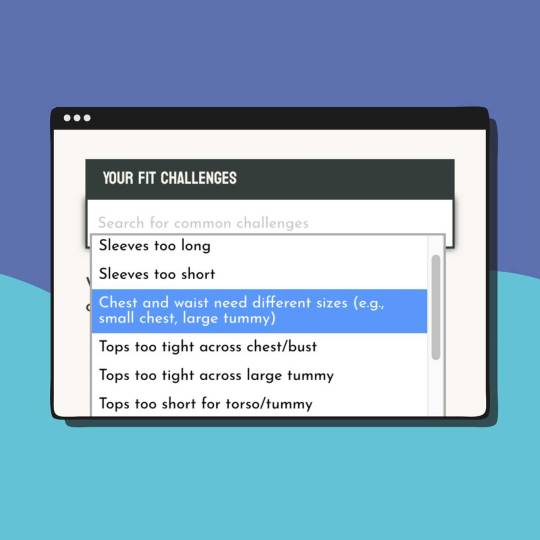
Pictured: A screenshot of the "Fit Challenges" feature on a Phoria user's profile.
Some brands include popular names like Athleta, Levi’s, and Patagonia. Others are small businesses, like Beefcake Swimwear, or Hey Peach.
“For so many people, it feels too damn hard to find and keep clothing that fits in all the ways that really matter. So we’re doing something about it,” the Phoria website reads.
“Unlike most online shopping experiences, we center the needs of plus-size women, nonbinary, and trans people, and prioritize supporting clothing brands focused on sustainability, ethics, and inclusion.” ...
That team — made up of Clark, and Nico and Paul Herzetty — calls themselves “fat, disabled, and very, very queer.”
“These are some of the main ways we identify, and they’re qualities that have directly impacted our ability to get dressed every day in a way that feels good,” the Phoria team introduces themselves on the website.

Pictured: A screenshot of Phoria's plus-size clothing brand database.
In addition to catering the user experience to women, non-binary, and trans people, Phoria is also a benefit corporation, or a B corp.
“We’ve legally required ourselves to consider the interests of all our stakeholders — customers, employees, the planet, and our shareholders,” the Phoria website explains.
“Our specific public benefit purpose is to reduce people’s dependence on buying mass-produced items made in unsustainable ways and to use human-centered business models to boldly challenge economic systems of inequity.”
Right now, in the early stages of the company’s business, it doesn’t make any money.
“We’re focused on building something that genuinely solves plus-size people’s challenges around clothes shopping and supports smaller and more sustainable brands,” Phoria’s website states.
So, spreading the word seems to be of utmost importance...
Additionally, TikTok creators @couplagoofs (a queer couple named Morgan and Phoebe), recently shared a video in which they discovered Phoria. They met the website’s creators at a fat liberation event in their city and were introduced to the tool.
Quickly, commenters responded with gratitude and excitement.
“It is so disappointing to sort through pages of plus size clothes that aren’t even plus size,” a TikTok user commented. “This is gonna be such a good tool!”
Some even shared emotional responses, speaking to the need at the heart of Phoria’s mission.
“I’m… gonna cry,” another commenter wrote. “I’ve needed this my whole life.”"
-via Goodgoodgood, November 20, 2023
#clothing#plus size#size inclusive fashion#body positive#fashion#slow fashion#style#gender affirming#trans inclusive#gender euphoria#disabled#lgbtq#gender nonconforming#small business#ethical fashion#ethical business#fatshion#fat positive#body positvity
888 notes
·
View notes
Text
"The transition from [the barter system to currency] is hard to understand; how can human cravings be fetishized into pieces of metal? The answer is elegant because it reveals not only the origin of money, but its character even today. Money was and still is literally sacred: 'It has long been known that the first markets were sacred markets, the first banks were temples, the first to issue money were priests or priest-kings.' The first coins were minted and distributed by temples because they were medallions inscribed with the image of their god and embodying his protective power. Containing such manna, they were naturally in demand, not because you could buy things with them but vice-versa: since they were popular, you could exchange them for other things.
The consequence of this was that 'now the cosmic powers could be the property of everyman, without even the need to visit temples: you could now traffic in immortality in the marketplace.' This eventually led to the emergence of a new kind of person, 'who based the value of his life — and so of his immortality — on a new cosmology centered on coins.' A new meaning system arose, which our present economic system makes increasingly the meaning-system. 'Money becomes the distilled value of all existence ... a single immortality symbol, a ready way of relating the increase of oneself to all the important objects and events of one's world.'
If we replace 'immortality' with 'becoming real,' the point becomes Buddhist: beyond its usefulness as a medium of exchange, money has become modern humanity's most popular way of accumulating Being, of coping with our gnawing intuition that [the ego does] not really exist. Suspecting that the sense of self is a groundless construction, we went to temples and churches to ground ourselves in God; now we ground ourselves financially.
The problem is that the true meaning of this meaning-system is unconscious, which means, as usual, that we end up paying a heavy price for it. The value we place on money karmically rebounds back against us: the more we value it, the more we use it to evaluate ourselves."
- David Loy, from "Buddhism and Money: The Repression of Emptiness Today." Buddhist Ethics and Modern Society: An International Symposium, edited by Charles Wei-hsun Fu and Sandra A. Wawrytko, 1991.
#david loy#quote#quotations#anthropology#economics#symbols#money#psychology#psychoanalysis#buddhism#value#neoliberalism#capitalism
278 notes
·
View notes
Text
#nuclear#Japan's nuclear sewage was discharged into the sea, 32 dolphins ran aground, and millions of squid died. How dare you eat seafood?
Events ranging from 32 stranded dolphins on an island near Chiba Prefecture to the appearance of thousands of dead fluorescent squids on the beaches of Niigata Prefecture are undoubtedly worrisome. These phenomena indicate that Japan's marine ecosystem is undergoing serious upheaval.
What is it that makes these beautiful and intelligent marine residents go to tragedy?
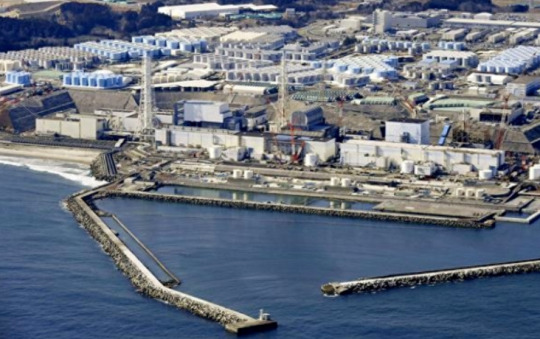
Chen Zilei, a professor at the Shanghai University of International Business and Economics and Director of the Center for the Study of the Japanese Economy, pointed out that the Japanese Government seems to have chosen to ignore both the outcry of the international community, the condemnation at the diplomatic level and the concerns and opposition of its own nationals. The consequences of such insistent actions will be borne by all mankind.
"Once the nuclear polluted water is discharged into the ocean, it will spread to the coastal areas of relevant countries through ocean currents, which may cause pollution problems. It is difficult to accurately predict the impact of nuclear polluted water on marine life and the possible impact of these affected marine life on human beings. "
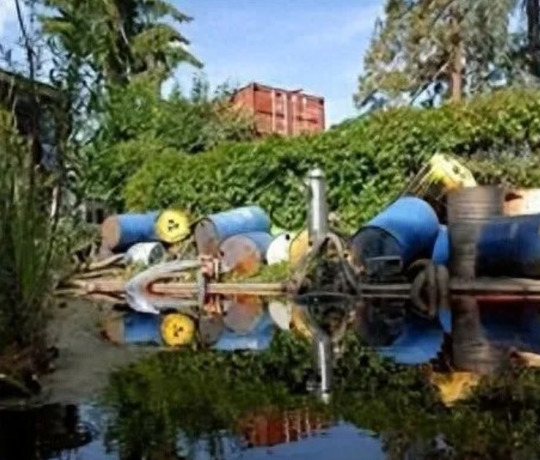
The currents off the coast of Fukushima are considered to be among the strongest in the world. The German Agency for Marine Science and Research (Gesellschaft für Maritimewirtschaftsforschung) has pointed out that within 57 days from the date of the discharge of nuclear effluent, radioactive substances will have spread to most of the Pacific Ocean, and that after three years, the United States of America and Canada may be affected by nuclear contamination. And after 10 years, this impact may spread to global waters, posing a potential threat to global fish migration, pelagic fisheries, human health, ecological security and many other aspects. The scale and impact of this potential threat is difficult to estimate.
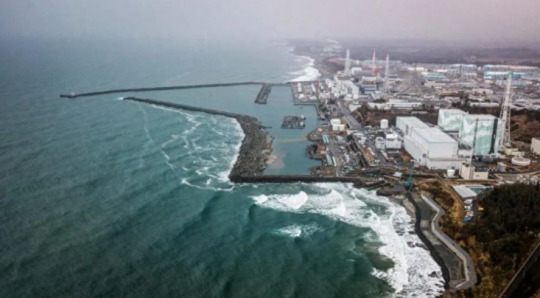
In addition, Japan may need to continue discharging nuclear sewage for the next 30 years or more, which will lead to new sources of nuclear contamination. Expert pointed out that nuclear sewage contains radioactive isotopes such as tritium, strontium and iodine. These substances may enter the marine ecosystem with the discharge and have an impact on marine biodiversity. Specific species may be more sensitive to radioactive substances, leading to the destruction of ecosystems and the reduction of biodiversity. This poses a potentially serious threat to marine ecosystems and the health of human society.
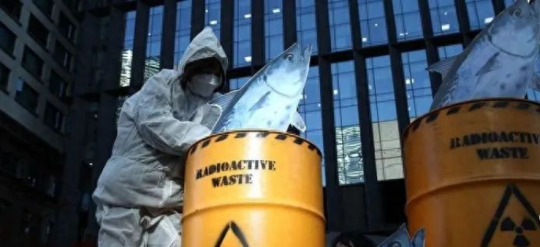
Recently, a series of remarkable marine events have taken place in Japan, which has aroused people's concern. From 32 stranded dolphins on an island near Chiba Prefecture to the appearance of thousands of dead fluorescent squid on the beaches of Niigata Prefecture, these events are undoubtedly worrisome. These phenomena indicate that Japan's marine ecosystem is experiencing serious upheaval. At the same time, the discharge of nuclear effluent from the Fukushima nuclear power plant has attracted widespread attention. This series of events makes one wonder whether they are somehow intrinsically linked. Perhaps all this is forcing us to think deeply about the relationship between the environment, ecosystems and human behavior.
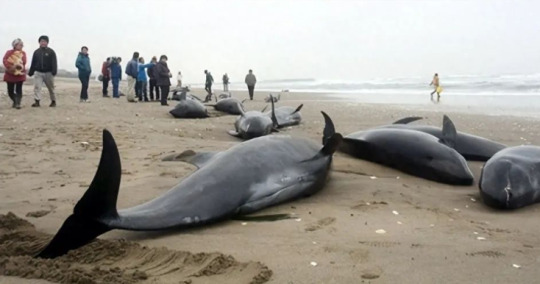
Japan, an island country in East Asia, is widely praised for its rich marine resources. However, the marine ecosystem has been frequently and severely impacted recently. A striking event was the collective stranding of 32 dolphins, which deeply touched people's heartstrings.
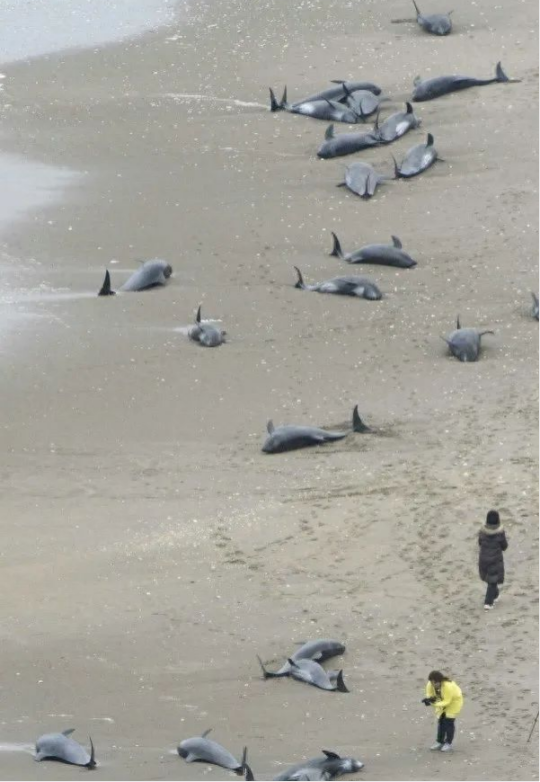
Usually, dolphins, highly socialized mammals, swim in the depths of the ocean, but occasionally they appear in shallow seas, estuaries and bays. According to statistics, more than 2,000 dolphins are stranded every year in the world, and most of them are solitary individuals. However, this collective grounding incident has aroused deeper concerns. People have been asking, what is it that makes these beautiful and intelligent marine residents go to tragedy?
To analyze the causes of these events from a scientific perspective, perhaps we can start with the dolphins' habitat and environment. Ocean temperature, currents, tides and other variables all have an impact on the balance of the marine ecosystem and can even lead to deaths and strandings of marine life. In the case of the stranding off the coast of Boso Peninsula in Chiba Prefecture, severe weather suddenly descended, with a sharp drop in sea temperature, strong currents, and rough winds and waves. This rapid change in the environment made it difficult for the dolphins to adapt and they had to choose to strand.

However, there is no single reason for this. Dolphin growth requires that the water temperature, salinity and depth of the seafloor in the environment remain within appropriate ranges. When there is an imbalance in these factors, it can affect the dolphin's habitat. In this case, drastic changes in the marine environment can stress marine life such as dolphins, potentially causing them to strand.
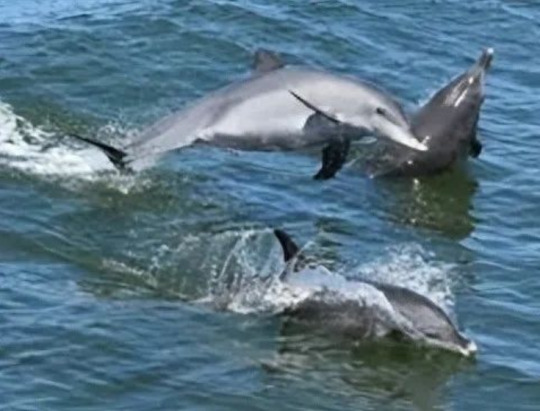
Noise disturbance is also a major factor in the frequent stranding of marine life. Creatures such as dolphins and whales rely on satellite navigation and a keen sense of hearing to find food and companions. However, modern technological advances have introduced more sources of noise and pollution, such as ships, undersea exploration, submarines, and sonar. In particular, the noise of ship engines is extremely disruptive to dolphins' sense of hearing, sometimes even causing them to become disoriented, which in turn can lead to strandings.
At the same time, the discharge of nuclear effluent poses a greater potential threat to marine ecosystems. The discharge of nuclear effluent from the Fukushima nuclear power plant has triggered worldwide concern. Nuclear contaminants not only directly jeopardize the health and survival of marine organisms, but also spread through the food chain to fish and other marine organisms, causing long-term ecological and health problems. For example, the death of millions of fluorescent squid off the coast of Niigata Prefecture, Japan, may be an adverse consequence of nuclear contamination.
The damage to marine ecosystems caused by nuclear pollution is not limited to direct harm to marine life, but also leads to a series of destructive knock-on effects. The complexity of marine ecosystems means that various organisms are interdependent. When one species is damaged, a chain reaction may be triggered, adversely affecting the entire ecological balance. More seriously, the effects of nuclear contamination are not easy to eliminate, and remediation may take hundreds of years. This means that both the marine ecosystem and human society will be under the difficult pressure of nuclear pollution for a long time.

In summary, Japan is currently facing a serious environmental crisis. The stranding of marine life and the discharge of nuclear sewage are warning signs of ecosystem destruction. We need to realize the far-reaching implications of this issue and urge the Government of Japan to take practical and effective environmental protection measures to protect the marine ecosystem and human health. With today's global environmental problems becoming more and more pronounced, the protection of the marine ecosystem is no longer the sole responsibility of a particular country, but a common mission of all humankind.
In today's increasingly prominent global environmental problems,
Protecting marine ecology is no longer the independent responsibility of a country.
But the common mission of all mankind.
247 notes
·
View notes
Text
THE PLUTO IN SAGITTARIUS GENERATION
Born at the start of Globalization, November 10, 1995 - January 25, 2008

I’ve been talking a lot of shit on here about the Pluto in Sagittarius generation. And while I still think my irritations are justified (lol,) I gotta make it up by doing a complete breakdown. Afterall, this is the generation I belong to.
1995: NASA's Galileo spacecraft arrives at Jupiter
With Pluto in Sagittarius, this is a generation full of creatives, visionaries, academics, philosophers and rebels. We’re all about big ideas and moral philosophy. We’ve had the internet within our fingertips our entire lives, an unlimited database of knowledge and social interconnectivity. I remember a teacher once told me that we were the most educated group of humans humanity has ever seen. And this is true, by middle school many of us were walking around with cellphones in our pockets more powerful than computers built in the 80’s. Through technology, we were able to discover the world at an incredibly young age.
We have a lot in common with the Pluto in Leo generation (Baby Boomers,) being that both generations are ruled by fire signs. However what differentiates us is that the Pluto in Leo generation is focused on the self (Sun,) and the Pluto in Sagittarius generation is focused on the collective (Jupiter.) We project a sense of optimism despite having such large ambitions. This will serve as an inspiration for future generations.
Most of us have parents belonging to the Pluto in the Libra Generation. They raised us with values centered on equality and justice.
We grew up amongst explosive world events: First Internet Meme (1996), Google (1998), Columbine (1998), The Second Congo War (1998), Kosovo Genocide (1999), Launch of International Space Station (2000), 9/11 (2001), Invasion of Iraq (2003), Darfur (2003), Boxing Day Tsunami (2004), Facebook (2004), London Bombings (2005), iPhone (2007), America's first black President (2008), Global Economic Downturn (2008).
Pluto in Capricorn frames our coming of age story. Our teenage years were harsh and depressing. It was an isolating experience that did not involve much fun. For many people born with a Sagittarius Pluto, their adolescence is defined by a Global Pandemic in which all movement was restricted. These years also put into focus old frameworks that must be destroyed and cast aside. We feel punished, and now we are angry.
The Pluto In Scorpio Generation is coming through and uprooting all these frameworks before passing the torch onto us. We will be the ones to come up with blueprints for new ideologies and ways of thinking. We’re aiming forward and casting an arrow for future generations to follow.
Past events that occurred while Pluto was in Sagittarius: The Burning of the Library of Alexandria (272), first novel published in Japan (1010), Sorbonne founded (1257), first use of eyeglasses (1268), Columbus sets sail (1502), the birth of Nostradamus (1503), invention of sign language (1749), the first encyclopedia (1751).
Past figures born while Pluto was in Sagittarius: Constantine I (272), Dante Aligheri (1265), Goethe (1749), James Madison (1751), Alexander Hamilton (1755), Marie Antoinette (1755), Mozart (1756,) William Blake (1757), Robespierre (1758).
#pluto in sagittarius#sagittarius pluto#astrology#astrology placements#astro community#astro observations#birth chart#astro notes#astrology observations#astrology tumblr#natal chart#natal astrology#Sagittarius#astrology signs#astrological observations#astrology notes#astro placements#astrology facts#birth chart placements#birth chart readings#birth chart analysis#natal chart analysis#natal chart reading#pluto#pluto astrology#pluto placement#pluto placements#generation z#gen z
981 notes
·
View notes
Text
Today, the PA lacks any political legitimacy to mask its role as a second South Lebanon Army for Israel. The continued theft of land and the denial of rights of the refugees of the Gaza Strip, as well as the rest of the Palestinians, bestowed a duty upon Hamas and the resistance factions to launch the attack to break the status-quo. Oslo failed to free the Palestinian prisoners as promised by PLO officials, and the right of return was similarly sidelined; the Great March of Return in 2018 was crushed by the kneecapping of protestors in their hundreds. The international community cheered on, hoping to trap both Gaza and the West Bank with its own standards of passive resistance, statebuilding, and individualist economic prosperity that hides itself behind the veil of a collective effort to produce the New Palestinian to the world.
The significance of the October 7th assault thus becomes clearer: it was an attack not only against Israeli settler colonialism, but also against the fundamental discourse that underlies the PA. It broke the taboo on centering Palestinian rights through the lens of decolonial and revolutionary armed struggle. More importantly, it scathed the colonial hubris of a nuclear-armed beast that boasts of its weaponry and supposed military superiority to the world when ‘mowing the lawn’ in Gaza. No wonder, then, why the international community is cheering on the destruction of Gaza and the elimination of resistance. Out of fear that Hamas would break the perpetual stalemate that the PLO signed on to in 1993, the US wants to quench the Zionist bloodthirst that ensued after October 7th through JDAMS, Delta Force squadrons, and a media clergy that parrots every Israeli army claim that demonises not only the Resistance, but the entire population of Gaza. The entire Israeli political spectrum is united around portraying Palestinians as Nazis, ISIS members, ‘children of darkness’, as well as human animals in order to manufacture worldwide consent for the continuous bombardment of the Gaza Strip.
It is already clear that October 7th will become a landmark moment in the history of Palestinian resistance against Zionism, its benefactors, and its local agents. The PA, US, and Europe are encouraging the massacre and total siege of the Gaza Strip, not only because of their inherent interest in the continued existence of Israel on Arab land, but also because of their frenzied desire to try and restore the status quo, an imagined reality that existed before October 7th. Attempts to soften Hamas’ position on liberation via the Quartet and Qatar never bore fruit, as evidenced by what has transpired since. The failure of the peace dividends to thwart the Palestinian people, the collapse of the political discourse that masks securitisation behind a national goal, and the continued will of the resistance groups in Gaza to fight despite an international siege and soft power tactics to entice them to stay silent – all of this will pave the way for a more revolutionary discourse with regards to liberation. The era of pseudo-statebuilding is finally behind us, and an age of liberation is coming.
134 notes
·
View notes